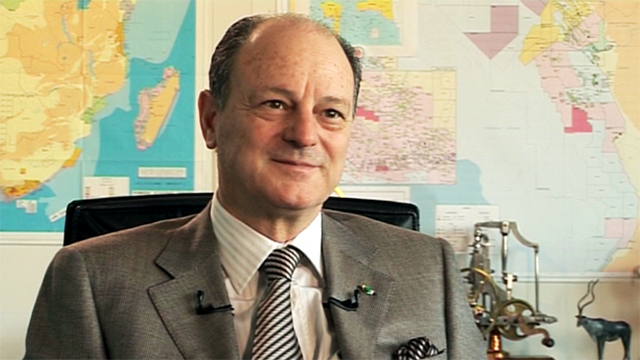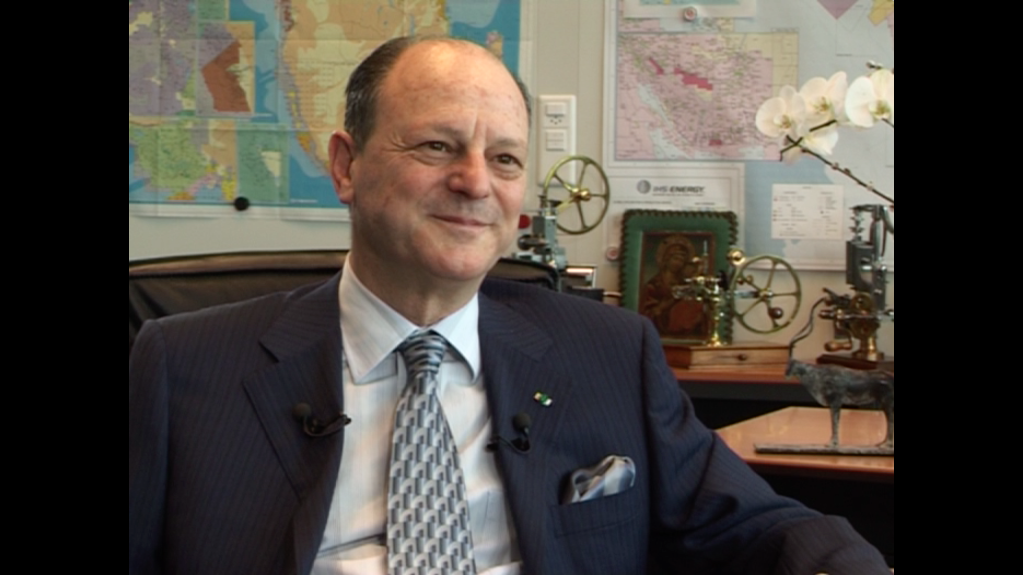EuroBusiness Media (EBM): Addax Petroleum, one of the leading independent oil and gas companies in West Africa, is listing its shares on the London Stock Exchange. Jean-Claude Gandur, welcome.
Jean-Claude Gandur (JCG): Thank you for having me.
EBM: You are the president and CEO of Addax Petroleum. Although Addax is now one of the larger independent oil companies, it's not yet a household name among investors. In a few words, what are the key things to know about Addax Petroleum as a company today?
JCG: As you may know, Addax Petroleum was created in 1994 and when we started, with a very small company - 8 thousand barrels a day production; 30 million barrels in reserves and now we have 354 million barrels of reserves and more than 120 thousand barrels a day production. So I believe that the market is recognising that Addax has made a lot of progress in a very short time. Now, on top of that, we are extremely present, as you know, in Nigeria, in Gabon and also in Cameroon, three countries based in West Africa.
EBM: You are now listing on the London Stock Exchange only one year after your IPO on the Toronto Stock Exchange. Why do you feel the need to list your company in London today?
JCG: For historical reasons we started in Toronto and we have noticed that a lot of our peer group companies are based in London. So we believe that going to London will give us better visibility. We're going to have better comparables with our peer group and enlarge our investor base.
EBM: Do you have any plans to increase the size of your free float either through an issue of new shares or a decrease in AOG stake, AOG which is the parent company of Addax?
JCG: If we talk about increasing the free float, I believe that we have already done a lot during the last year. When we went public we started with a very limited float of 15%. Now the liquidity's about 56%. So if we go for more liquidity, it's going to come more from new acquisitions more than asking our shareholders to participate in our budget or our capex? As far as AOG is conncerned, as you know, I'm a happy shareholder too, and I do not anticipating selling any of our shares.
EBM: How would you describe the value proposition for someone looking to make an investment in your stock? Are you more of a growth story, a profitability story, a value story?
JCG: I believe that we are a mix of the three. When we talk about growth, I would say our operation growth is impressive. We deal with 7 rigs presently, we have a lot of activities going on and we have proved to be able to add value also to our shareholders. Now coming to the valuation of the company, there is a gap between us and our peer group. And one of the reasons, also, why we go to London, is to try to close this gap between us and our peer group.
EBM: What is your rationale for investing mainly in geopolitically difficult areas such as Nigeria or Kurdistan in northern Iraq?
JCG: You say difficult, I say challenging. I think it's more important to understand the philosophy of the company. Ive been 30 years working in Africa; I know each of those countries, I know the people, I know the mentalitites, I know most of the communities. So for a company like Addax it's not very difficult to deal in the countries you have just described. I believe that Addax has created a model, a model of participation with the host communities and this is what is the most important to us.
EBM: Following the recent election in Nigeria, how is the political turmoil in the country likely to affect your current and future projects there? In particular, how receptive is the new government to the interests of the oil companies?
Nigeria got its independence in 1960. Therefore it's more than half a century now that this country is running with its own businesses. I haven't seen ever a change in the legislation in this country so far. What we can see in the future, is that when there is a new bidding ground, then the government obviously is tougher in the terms they are offering to different stakeholders or newcomers, which is normal - you see that in all the countries in the world. But as far as the former contracts have been established, they are still valid and they have never been changed by any government.
EBM: In your financial statements at the end of 2006, your estimate of the size of your Iraqi reserves is considered very conservative by some analysts. Should we expect the size of the reserves to increase by the end of 2007 as you gain more certainty?
JCG: Taq Taq is probably what you can call a world class asset. It is difficult at this stage to tell you exactly how much we are going to recover out of that. Now, we have gained a lot of knowledge through various drills we have done so far. We are presently testing TT06, which is the sixth well, which is going to be one day a producer. We have studied the TT07, so we are going to know more and more about this field. But we believe that this is really a big, big asset for the company.
EBM: The market has concerns over the Iraqi petroleum law. Do you see any possible hitches in the ratification of the law which could be detrimental to oil contractors? What are the chances of the law undergoing modifications compared with the text that has already been presented?
JCG: Obviously this is the big question today even for us. We saw a lot of differences between what the Kurdish government of Iraq is saying and what the central government is saying. We believe that at the end of the day, for the good of Iraq, they will come on the same line and accept a common law, which will be for the good of everybody. As far as we are concerned, obviously we obey to the government which has been giving us our asset, which is the Kurdish region of Iraq. For the time being we haven't seen anything different to what we've been set all along from the first day. So we consider that everything will come into place, slowly, slowly. As you know, they are building a new country. We have to be a little bit patient on that.
EBM: Considering the Taq Taq field you will extract from in Northern Iraq, what are the rates of extraction, what are the pipeline routes and costs, and what is the timing of completion?
JCG: The time of completion is very much dependent on the law. Now, to export you need a pipeline. So we will have to build a pipeline which we anticipate to link to the Sehan pipeline in Turkey. It's a massive oilfield, it's a first class asset. So I'm extremely positive that Taq Taq will bring a lot of wealth to our shareholders and to the company.
EBM: The oil industry has had such a great run these past years that many companies are saying that they're having a hard time finding talents to recruit as the human resource is rare on the market. How are you dealing with this issue. In particular, how are you able to attract talents to come work for you in unstable parts of the world, when your competition can offer similar jobs in safer places?
JCG: We haven't faced any big difficulty in getting the right people we wanted for the company. The package is not enough. You have to offer more than that. You must offer a challenge to people, you must offer an environment, a culture. And also for young people joining a company in full growth, you need to give them the chance to express themselves and say what they have to say and listen to them. These are the conditions to get people to come to you. And then you have another factor which is extremely important. It's what one person says to another. If the first one is happy, the second will be happy. And that's how we have built here a new culture. My real challenge is when people working with Addax will not refer to their former employer, but they will say, "I'm coming from Addax".
EBM: Are you looking to make more acquisitions and if so, what geographical areas interest you, what size of companies are you interested in acquiring and within what kind of a time frame?
JCG: We will concentrate on what we know best. And what we know best its West Africa and the Middle East. We are pioneers in the northern part of Iraq, we have a long tradition in the Western part of Africa. We have good assets and we look to grow through different roots -either by new acquisitions with governments, or by acquisitions of companies with the same kind of appraoch that we have on the market.
EBM: How are you finding the rig market these days? Is the tightness in the market a problem for you?
JCG: We are well covered until the end of 2008. We have under contract 7 rigs. We have just contracted for the Aban Abraham, which is a deep rig for our porftolio of deep water.
We believe that, as far as we are concerned for the time being, we are well equipped for our growth story.
EBM: Jean-Claude Gandur, Addax Petroleum, thank you very much.
JCG: Thank you to you.



